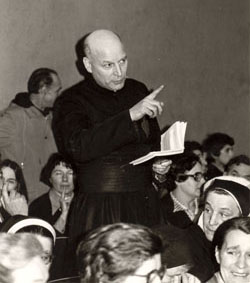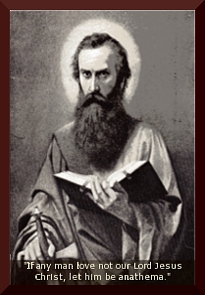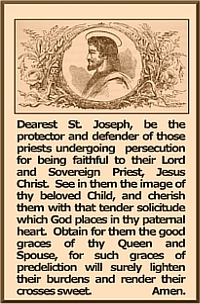
Fr. Congar was forced by Fr. de Nantes to recognize publicly that « the statement on Religious Freedom says something materially different from the propositions of the Syllabus » CCR n° 84, March 1977, p. 4)
For a proposition to be declared infallible, the Abbé reminded the faithful, it must be a proposition already contained in the deposit of the faith directly received from the Apostles, and to have been continuously believed by the faithful since. The theologian Abbé De Nantes died on February 15, 2010, but his work and thought continue to be disseminated by the Brothers of his Community. The article that follows (linked to the source) is from their web page “The Catholic Counter-Reformation in the 21st Century”:
“ Hearing the word of God with reverence and proclaiming it confidently, the Sacred Synod takes its direction from these words of St. John : ‘ We announce to you the eternal life that dwelt with the Father and has appeared to us. What we have seen and heard we announce to you, so that you also may have fellowship with us and our fellowship may be with the Father and with His Son Jesus Christ ’( 1 Jn 1:2-3 ). ”
The authority of the Second Vatican Council is thus affirmed in the first lines of the Constitution Dei Verbum with particular solemnity, a solemnity that had until then been reserved for solemn definitions, even though this Sacred Synod had no intention of undertaking definitions of this sort.
In his intervention on September 30, 1964, Cardinal Ruffini declared this text “ inept ”, i.e. misplaced. In fact, the “ ineptitude ” consisted in the fact that the Council took itself for the College of the Apostles, immediate witnesses to Christ, and inspired by Him.
“ St. John, who is improperly cited, had seen and touched the Word of Life, and he related, with the assistance of the divine inspiration that was granted to the Apostles, what he himself had heard and seen Christ say and do. However, neither Paul VI, nor Cardinals Alfrink, Suenens, Marty, etc., nor the Council as a collegial whole, saw, touched or heard Christ. ” ( Fr. de Nantes CRC n° 51, December 1971, p. 10 )
An equal solemnity, all the more surprising because it was not provided for in the regulations, would be given by Paul VI at the proclamation of each of the texts of the Council.“ The whole and each one of the points decreed in this Pastoral Constitution ( or : this decree ) have pleased the Council Fathers ( placuerunt Patribus ). And We, by virtue of the apostolic power We hold from Christ, in union with the venerable Fathers ( cum venerabilibus Patribus ), We approve, fix and decree in the Holy Spirit, and We order that what has thus been established in Council be promulgated for the glory of God. ”
Unanimous ? A question…
Paul VI adopted such a solemn manner of expression that one would expect him to fulminate an anathema against opponents. There, however, were no opponents. Is this true ? Yes, true ! No opponents are mentioned in the Acts of Vatican II ; unanimity is total. That is why Paul VI wanted this to be mentioned in the formula of promulgation of each of the Acts of the Council. He associated the episcopal College to his own authority. This, at least, is the official truth.
It persisted until the last day, when the famous and very controversial “ Declaration on Religious Liberty ” was promulgated :
The whole and each of the points decreed in this declaration have pleased the Council Fathers. And We, by virtue of the apostolic power We hold from Christ, in union with the venerable Fathers, We approve, rule and decree in the Holy Spirit, and We order that what has been thus established in Council be promulgated for the glory of God.
In Rome, at Saint Peter’s, December 7, MCMLXV. Ego PAULUS Catholicae Ecclesiae Episcopus.
No allusion or concession even to the 70 opponents and the 8 silences for the first vote, on Religious Liberty. Reduced to nothing, these dissidents, these objectors, these grousers are excluded from general consideration. Without them, this “ Sacrosanct and Universal Second Vatican Council ” has a white and shiny unanimity !
Such has been “ the new way of feeling, desiring and behaving ” that Paul VI has praised since the Council. ( Fr. de Nantes, CCR n° 246, April 1992 )
In none of the promulgations of the sixteen Acts of Vatican II, did Paul VI deign to follow the Council Regulations which had imposed ne varietur the formula to be used by the Sovereign Pontiff in person to announce the results of the votes and, in view of these results – here is true collegiality ! – proclaim his sovereign decision. This formula necessitated reporting the unanimity of the votes or else mentioning the existence of opponents and their number ! Previous Councils had all been scrupulously faithful to this rule, which distinguishes a Sacred Council from a vulgar “ robber ” council. It was done at the First Vatican Council, magnificently ! When the dogma of Papal Infallibility was proclaimed, Pius IX declared that “ the decrees and canons are pleasing to all the Fathers, except for two of them. ” In fact, at the final scrutiny of this last public session two opponents did show up. And they moreover, moved as one can imagine, but honoured in their authority as Council judges, legislators and definers, immediately wanted to assure the Pope and the Council Fathers of their submission to and acceptance of the new dogma. That kind of honesty, which prevailed among the old Fathers and Doctors of the Church… was missing at Vatican II !
Such was “ the old manner of desiring and behaving ”.
Too strong for its weaknesses.
Furthermore, in the invention of this novel formula, Paul VI took it upon himself to work a further abuse : he amplified the strictly sober formula laid down by the regulations, to give it an excessive and theologically unacceptable tenor. The superfluous period created by Paul VI falsely gives the sixteen Acts of Vatican II the character of an extraordinary and solemn teaching, therefore infallible and irreformable ; when canonically and dogmatically they are not worthy of it.
Thus the entire Church as a Constituent Assembly went to meet the world to establish a new alliance, the first principle of which would necessarily be Religious Liberty, a revolutionary dogma that is written at the beginning of all the Constitutions of the Republic since 1789 and of the Declaration of the Rights of Man.
Unanimity was to be a substitute for infallibility. Since infallibility was imposed, however, the Council ought to have compelled to respect the rules that concern it: for a proposition to be endowed with this character, that is to say for it to enter the “ ordinary ” domain of the Catholic Faith, it has to belong to the deposit received from the Apostles and to have been upheld constantly down to us, or at least never to have been opposed.
God put in parentheses.
Religious Liberty has always been condemned by the Church when confronted with Revolution, which has this “ liberty of perdition ” ( Saint Augustine ), as its principle and foundation. “ For as you well know, Venerable Brethren, ” Blessed Pius IX wrote, “ at this time there are not a few who dare to teach that ‘ the best political constitution and the progress of civil life altogether require that human society be conducted and governed without any more account being taken of Religion than if it did not exist, or at least without any distinction being made between the true religion and false ones. ” And against the doctrine of Scripture, of the Church and of the holy Fathers, they do not hesitate to assert that ‘ the best condition of civil society is that in which it is recognized that civil power is not obliged to use legal penalties to suppress violations against the Catholic religion, except in so far as public order requires it. ’
“ From this idea of social government they do not fear to maintain that erroneous opinion, described by Our Predecessor, Gregory XVI, as an ‘ insanity ’, namely that ‘ liberty of conscience and worship is each man’s personal right, which ought to be legally proclaimed and asserted in every rightly constituted society ; and that citizens have a right to an absolute liberty openly and publicly to manifest their opinions whatsoever they might be, by means of speech, the press or any other method, without civil or ecclesiastical authority being able to impose any limit on this right. ’ ” ( Quanta Cura )
With a frankness that does him credit, Fr. Martelet, S. J. admitted forthrightly to the Council Fathers :
“ If you wish to base Religious Liberty on God, you will obviously never succeed, because the relation between God and Christ and the Church is direct and rules out State secularism as well as ecumenism. God must therefore be put in parentheses ( sic ) and your schema must be based on human dignity. ” A proposal which everyone found acceptable…
Without any basis in Scripture or Tradition, Religious Liberty was imposed on Paul VI’s own authority.
The appeal to infallibility.
Since Paul VI showed such determination, such authority to impose the conciliar Reform and in particular Religious Liberty, we will unwearyingly appeal to the authority of his successor in order that life and honour may be given back to the opponents and that a solemn ruling may be made between Catholic Truth and revolutionary error instead of acting as though we do not exist.
Immediately the Council was over, our Father, enjoined to adhere to the Acts of the Council, appealed to the sovereign authority of the Holy Office, which had been abolished the day before the closing of the Council. It was reopened at his request. The preliminary investigation of the trail [trial] took place but the complaint remained in suspense and he himself was declared “ disqualified. ”
“ Hans Küng and I were both summoned before the Holy Office at the same time, ” Fr. de Nantes wrote. “ I went ; he refused to go. And he continues as before to criticize the Church and her divine institutions, while he is photographed, smiling, at the Pope’s side. In his latest book, ‘ Infallible ? An Enquiry ’, he sets about destroying the dogma solemnly proclaimed by the First Vatican Council. The Italian translation of the book has just been published in Rome itself. If you allow this, then it means that everything is permitted, even a direct assault on your own function, even to insult you to your face ! ”
Such a way “ of desiring and behaving ” disqualifies this entire Council.




Ha! Great minds think alike. Yesterday, I posted in inquiry to the CRC in Canada. Thank you for the link to pictures. Wouldn’t I love to interview him! (Although I get the impression he was an ecumenist.)
Pray for me!
Fiat
Fiat,
Thanks for your reply.
Initially, I got Fr Martelet’s quote from the french site http://www.crc-resurrection.org
I asked them but got no reply until now.
So far as I know, Fr Martelet was still alive in 2010. He will turn 100 in 2016 if God permits.
See some pictures of him in the retired jesuits home of Paris: http://www.jesuites.com/2011/09/communaute-saint-francois-xavier/
God bless you.
Jacques
Jacques,
I do not know anything more than what is written. I will try to find more info, but it might be difficult since I do not read French. Fr. Martelet did write a book: Les Idées maîtresses de Vatican II : initiation à l’esprit du Concile. which might contain answers to your question.
Do you know if he is still alive? I figure he would be about 96 years of age right now.
In their Most Sacred Hearts,
Fiat
I would be very grateful if anyone could provide me with accuracy the references of Fr Martelet’ s quote in that article:
“ If you wish to base Religious Liberty on God, you will obviously never succeed, because the relation between God and Christ and the Church is direct and rules out State secularism as well as ecumenism. God must therefore be put in parentheses ( sic ) and your schema must be based on human dignity. ”
I guess he said this during the council when he had been appointed as theologian to the french speaking bishops of Africa, but when exactly did he?